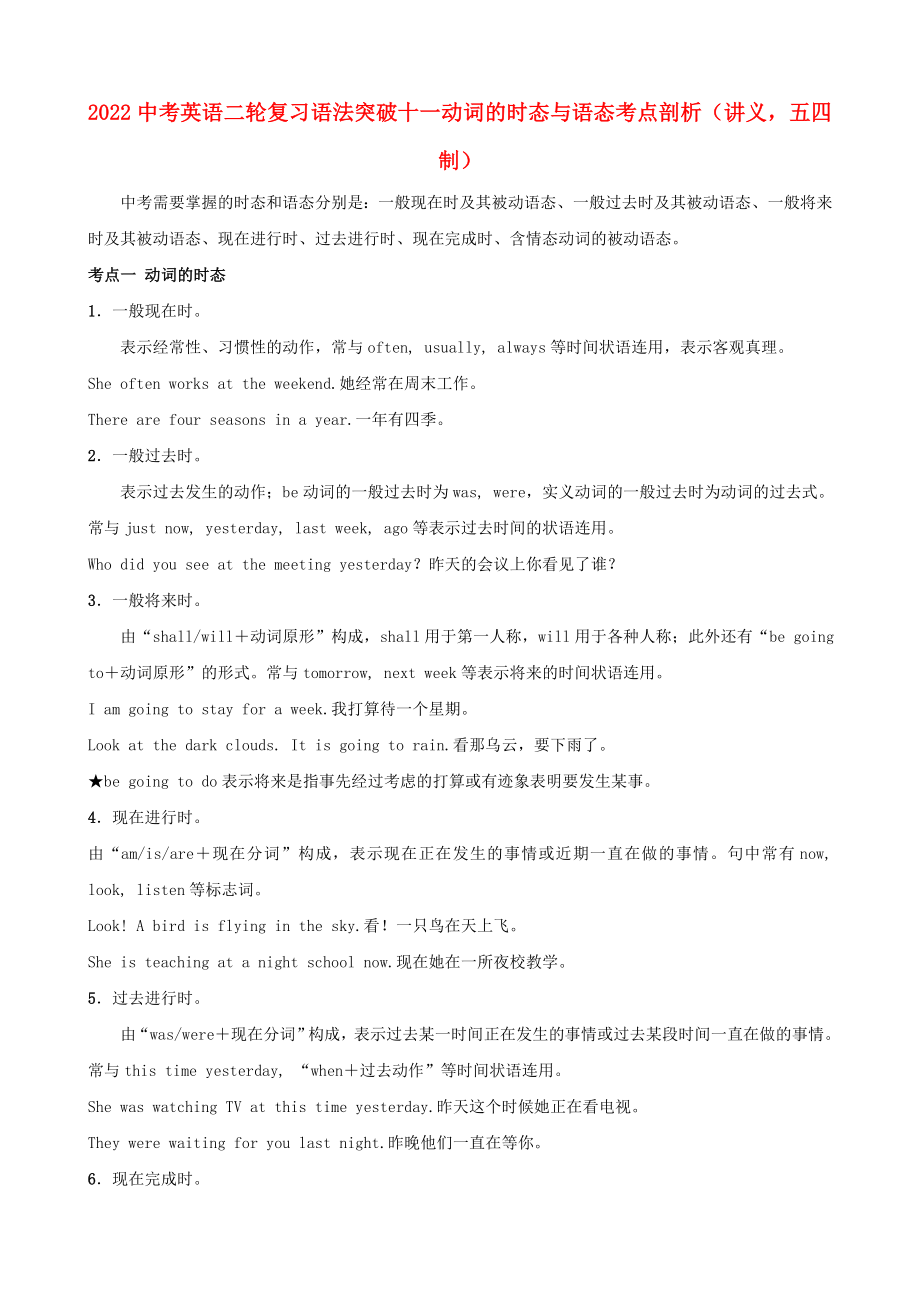《2022中考英語二輪復(fù)習(xí) 語法突破十一 動(dòng)詞的時(shí)態(tài)與語態(tài)考點(diǎn)剖析(講義五四制)》由會(huì)員分享�,可在線閱讀,更多相關(guān)《2022中考英語二輪復(fù)習(xí) 語法突破十一 動(dòng)詞的時(shí)態(tài)與語態(tài)考點(diǎn)剖析(講義五四制)(5頁珍藏版)》請?jiān)谘b配圖網(wǎng)上搜索�。
1、2022中考英語二輪復(fù)習(xí) 語法突破十一 動(dòng)詞的時(shí)態(tài)與語態(tài)考點(diǎn)剖析(講義�,五四制)
中考需要掌握的時(shí)態(tài)和語態(tài)分別是:一般現(xiàn)在時(shí)及其被動(dòng)語態(tài)����、一般過去時(shí)及其被動(dòng)語態(tài)���、一般將來時(shí)及其被動(dòng)語態(tài)、現(xiàn)在進(jìn)行時(shí)��、過去進(jìn)行時(shí)�、現(xiàn)在完成時(shí)、含情態(tài)動(dòng)詞的被動(dòng)語態(tài)�。
考點(diǎn)一 動(dòng)詞的時(shí)態(tài)
1.一般現(xiàn)在時(shí)。
表示經(jīng)常性��、習(xí)慣性的動(dòng)作���,常與often, usually, always等時(shí)間狀語連用�,表示客觀真理�。
She often works at the weekend.她經(jīng)常在周末工作。
There are four seasons in a year.一年有四季���。
2.一般過去時(shí)�����。
表示過去發(fā)生的
2���、動(dòng)作�;be動(dòng)詞的一般過去時(shí)為was, were��,實(shí)義動(dòng)詞的一般過去時(shí)為動(dòng)詞的過去式���。常與just now, yesterday, last week, ago等表示過去時(shí)間的狀語連用�。
Who did you see at the meeting yesterday�����?昨天的會(huì)議上你看見了誰����?
3.一般將來時(shí)。
由“shall/will+動(dòng)詞原形”構(gòu)成����,shall用于第一人稱,will用于各種人稱����;此外還有“be going to+動(dòng)詞原形”的形式。常與tomorrow, next week等表示將來的時(shí)間狀語連用�����。
I am going to stay for a week.我打算待一
3����、個(gè)星期。
Look at the dark clouds. It is going to rain.看那烏云��,要下雨了��。
★be going to do表示將來是指事先經(jīng)過考慮的打算或有跡象表明要發(fā)生某事�。
4.現(xiàn)在進(jìn)行時(shí)。
由“am/is/are+現(xiàn)在分詞”構(gòu)成�����,表示現(xiàn)在正在發(fā)生的事情或近期一直在做的事情�����。句中常有now, look, listen等標(biāo)志詞��。
Look! A bird is flying in the sky.看���!一只鳥在天上飛����。
She is teaching at a night school now.現(xiàn)在她在一所夜校教學(xué)。
5.過去進(jìn)行時(shí)�。
由“was/
4、were+現(xiàn)在分詞”構(gòu)成��,表示過去某一時(shí)間正在發(fā)生的事情或過去某段時(shí)間一直在做的事情���。常與this time yesterday, “when+過去動(dòng)作”等時(shí)間狀語連用����。
She was watching TV at this time yesterday.昨天這個(gè)時(shí)候她正在看電視�����。
They were waiting for you last night.昨晚他們一直在等你��。
6.現(xiàn)在完成時(shí)����。
①由“have/has+過去分詞”構(gòu)成,表示過去某時(shí)發(fā)生的動(dòng)作一直延續(xù)到現(xiàn)在或過去的動(dòng)作對現(xiàn)在有影響��。標(biāo)志詞有since, for, already, yet, so far等�。
I hav
5�、e lived in London since 10 years ago.自從10年前我就一直在倫敦居住�。
They have lost the match.他們已經(jīng)輸了比賽。
②當(dāng)句中有“How long...�?/since.../for...”等時(shí)間狀語時(shí),句中動(dòng)詞要用延續(xù)性動(dòng)詞����。非延續(xù)性動(dòng)詞與延續(xù)性動(dòng)詞的轉(zhuǎn)換如下:
buy→have borrow→keep leave→be away
die→be dead bee→be e to→be in
begin→be on stop→be over
open/close→be open/closed
leave+地點(diǎn)
6����、→be away from+地點(diǎn)
join→be in/a member of
單項(xiàng)選擇
1.(xx·山東萊蕪中考)—Could you help me clean the floor, Bob?
—Wait a moment. I for some information about the World Cup.
A.search B have searched
C.a(chǎn)m searching D was searching
2.(xx·上海中考)Michael in a school in Yunnan from Februar
7、y to June next year.
A.teach B.taught
C.will teach D.was teaching
3.(xx·湖北黃岡中考)—Your new watch is so nice! When did you buy it?
—In April. I it for two months.
A.have had B.had
C.have bought D.bought
考點(diǎn)二 被動(dòng)語態(tài)
被動(dòng)語態(tài)表示主語是動(dòng)作的承受者�。
1.主動(dòng)變被動(dòng)結(jié)構(gòu)圖:
★及物動(dòng)詞有被動(dòng)語態(tài),不及物動(dòng)詞必須帶有介詞
8����、才可以有被動(dòng)語態(tài)。
2.各種時(shí)態(tài)的被動(dòng)語態(tài)構(gòu)成:
語態(tài)
構(gòu)成
例句
一般現(xiàn)在時(shí)的
被動(dòng)語態(tài)
am/is/are+過去分詞
This machine is made in China.
這臺(tái)機(jī)器是中國制造的�。
一般過去時(shí)的
被動(dòng)語態(tài)
were/was+過去分詞
Jim was told to e early.
吉姆被告知要早到。
一般將來時(shí)的
被動(dòng)語態(tài)
will/shall+be+過去分詞
The bridge will be finished in a month.這座橋?qū)⒃谝粋€(gè)月后竣工��。
現(xiàn)在進(jìn)行時(shí)的
被動(dòng)語態(tài)
am/is/are being+過去
9�、分詞
The flowers are being watered by the workers.工人們正在澆花。
現(xiàn)在完成時(shí)的
被動(dòng)語態(tài)
have/has been+過去分詞
My car has been repaired for a week.
我的車修了有一個(gè)星期了��。
過去進(jìn)行時(shí)的被動(dòng)語態(tài)
was/were being+過去分詞
The trees were being cut down yesterday afternoon.昨天下午人們正在砍樹。
過去完成時(shí)的被動(dòng)語態(tài)
had been+過去分詞
By the time we got there, the fi
10���、re
had been put out.
我們到時(shí)�����,火已經(jīng)被撲滅了����。
過去將來時(shí)的被動(dòng)語態(tài)
should/would be+
過去分詞
They said the work would be finished on time.他們說將會(huì)按時(shí)完成工作���。
情態(tài)動(dòng)詞的
被動(dòng)語態(tài)
can/may/must/should等+be+過去分詞
Your homework should be done on time.你應(yīng)該按時(shí)完成作業(yè)��。
單項(xiàng)選擇
1.(xx·山東萊蕪中考)—Laiwu has developed a lot in the last few years.
—Yes. And the high-speed rail in 2020.
A.pletes B.is pleted
C.will be pleted D.will plete
2.(xx·吉林長春中考)We Chinese by the touching documentary Amazing China.
A.encourage B.encourages
C.a(chǎn)re encouraged D.a(chǎn)re encouraging
參考答案
考點(diǎn)一
1~3 CCA
考點(diǎn)二
1~2 CC
 2022中考英語二輪復(fù)習(xí) 語法突破十一 動(dòng)詞的時(shí)態(tài)與語態(tài)考點(diǎn)剖析(講義五四制)
2022中考英語二輪復(fù)習(xí) 語法突破十一 動(dòng)詞的時(shí)態(tài)與語態(tài)考點(diǎn)剖析(講義五四制)

